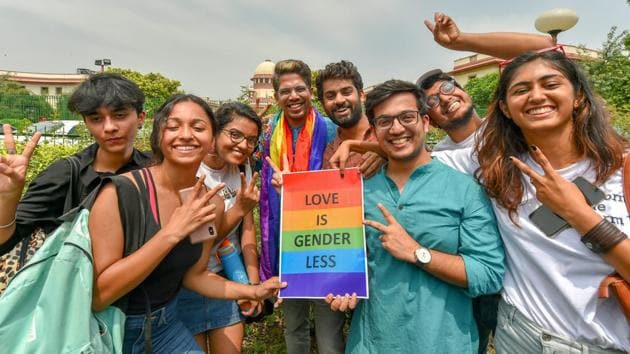Right to privacy verdict formed basis of ruling for Supreme Court
The four separate but concurring judgements heavily rely on the facet of privacy declared to be an intrinsic part of Article 21 of the Constitution last year.
The Supreme Court’s 2017 verdict in the right to privacy case formed the basis for Thursday’s ruling that decriminalised adult consensual same-sex acts. The four separate but concurring judgements heavily rely on the facet of privacy declared to be an intrinsic part of Article 21 of the Constitution last year.

Intimate relations are a matter of complete personal choice. It is a vital personal right, falling within the private protective sphere and realm of individual choice and autonomy, read the lead judgement written by Chief Justice Dipak Misra.
Speaking for Justice AM Khanwilkar and himself, the CJI said Section 377 of the Indian Penal Code (IPC) restricted an individual’s choice to engage in acts within their private sphere. Personal choices fall within the realm of individual choice and autonomy that is an innate and inalienable part of identity.
“He or she can surrender his or her autonomy wilfully to another individual and their intimacy in privacy is a matter of their choice,” the CJI said. “As sexual orientation is an essential and innate facet of privacy, the right to privacy takes within its sweep the right of every individual to express their choices in terms of sexual inclination without the fear of persecution or criminal prosecution,” read the CJI’s judgement.
Pondering over whether the state can be allowed to draw the boundaries between permissible and impermissible intimacies between consenting adults, Justice DY Chandrachud in his judgement focused on what the meaning of the term “order of nature” is. Section 377 punished adults of the same sex indulging in unnatural sex that was against the order of nature.
“Homosexuality has been documented in almost 1500 species, who “unfortunately are not blessed with rational capabilities (and the propensity to ‘nurture’ same sex thoughts) as are found in mankind.” Denial of right to sexual orientation, he said, is also denial of the right to privacy.
Justice RF Nariman referred to the privacy judgement and found fault with the 2013 Supreme Court verdict in the Suresh Kumar Koushal case that overturned a Delhi high court verdict decriminalising homosexuality. He said equal protection demanded equal protection of the identity of every individual without discrimination. The Mental Healthcare Act notified in 2017 was also quoted to point out that Parliament too was alive to privacy interests. “This definition (under the Act) throws to the winds all misconceptions of mental illness including the fact that same sex couples who indulge in anal sex are persons with mental illness,” the judge said.
Section 377 criminalises consensual sexual acts between adults in private and this is not based on any sound or rational principle, said Justice Indu Malhotra. “The choice of LGBT persons to enter into sexual relations with persons of the same sex is an exercise of their personal choice, and an expression of their autonomy and self-determination in community,” the judge said






